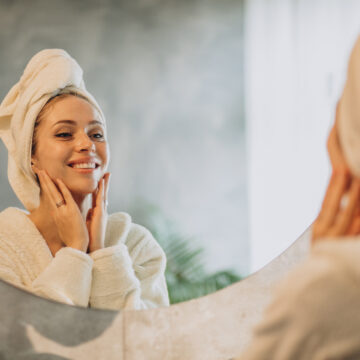
-
- While washing your hands frequently and wearing masks prevent COVID-19 spread, they can also damage your skin.
- The key to keeping your skin healthy is making sure it is always clean and well-moisturized.
- Use skin care products that don’t contain fragrances and don’t clog your pores.
Nowadays, people are washing or sanitizing their hands more frequently. Many are also wear face masks when at work or in public. These measures are all necessary to prevent the spread of the coronavirus. However, it can also irritate and damage the skin. Here’s how you can counteract these effects.
Hand care

Washing your hands ever so frequently can strip off their natural oils and cause dry, cracked skin. To prevent this:
- Wash your hands with cool or lukewarm water. Hot water isn’t more effective against sickness-causing germs. It can also cause more skin damage.
- Avoid using antibacterial cleansers. These products aren’t beneficial for preventing infectious disease. They also contain chemicals that can irritate the skin.
- Wear gloves when cleaning to protect your skin. Disinfectants for cleaning surfaces are effective against germs, but some of the ingredients can be harsh on your hands.
- Moisturize. Apply plenty of hypoallergenic moisturizer on your hands after washing them. Avoid products that contain fragrances and dyes that can irritate your skin. Choose moisturizers that contain urea, glycerin or hyaluronic acid. You can layer moisturizers to ensure that the moisture is locked in. You may also cover your moisturized hands with cotton gloves overnight. Moisturize your hands regularly even if they don’t feel dry or chapped.
Facial care

Many essential workers wear masks throughout their shifts to avoid contracting the coronavirus from people who have it but don’t realize it. However, wearing a mask regularly can lead to skin chafing, itchiness, rash, or acne breakouts on your nose bridge, chin, cheeks and behind the ears. To prevent skin issues:
- Establish a regular skincare routine. Always clean and moisturize your face before and after you wear a mask. Use products that are “noncomedogenic” so they don’t clog your pores. Avoid products with petrolatum as it can hinder the mask’s function. get
- Use a barrier ointment or bandage. Applying a thin layer of zinc oxide on the bridge of your nose or behind your ears can prevent or relieve skin damage caused by pressure or friction from wearing masks. You can also use a bandage as a protective barrier between the mask and the skin pressure points. Make sure to use bandages or dressings that cools the skin and conforms to it without getting in the way of the mask’s function.
- Ease blisters. If you get a blister, apply antibiotic ointment to keep it clean. You can also use a bandage to protect the blister from the friction created by the mask rubbing on the skin.
- Treat acne. If you get acne, cleanse your skin regularly, and moisturize with a water-soluble moisturizing product. Apply acne treatment that contains salicylic acid or benzoyl peroxide. Don’t pop or squeeze your pimples to avoid infection and inflammation of the area.
Professional care

Continue washing your hands and wearing masks to protect yourself against COVID-19, and follow the steps above to protect your skin. If your skin starts to crack and bleed, the blisters can turn into ulcers or become infected. If this happens, or if you develop a severe skin reaction, consult your doctor. Skin damage can raise your risk of infection that may require hospitalization, prescription medicines, or skin therapies.
Source: Mayo Clinic
